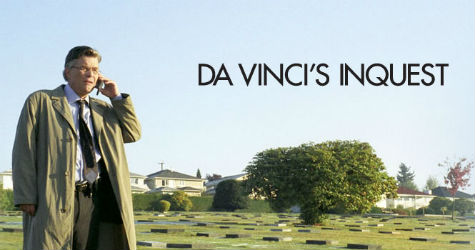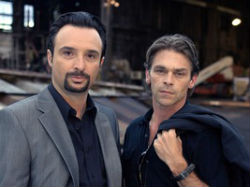
Mounties aside, we in the U.S. don’t usually think of Canada as the sort of place that would spawn a great TV police show. (Insert polite-criminal joke here.) Yet it did: Da Vinci’s Inquest has been called by some the best crime series ever made. Premiering at the same time as The Sopranos, it won the Gemini – the Canadian version of the Emmy – for Best Dramatic Series five times during its seven seasons. The New York Times said it resembled “the good, early days of N.Y.P.D. Blue or ER.”
So what did Chris Haddock, the creator and co-writer of Da Vinci’s Inquest and the subsequent Da Vinci’s City Hall (yes, a sequel), do for an encore? He made another show just like them, except about domestic surveillance and organized crime. He called it Intelligence.
Its basic premise is very familiar now, but not so much in 2005 when it debuted, and hardly at all in Canada back then. Mary Spalding (Klea Scott: Millennium, Robbery Homicide Division), the ambitious director of the Vancouver Organized Crime Unit (OCU), has struck a deal with Jimmy Reardon (Ian Tracey, Da Vinci’s Inquest, Bates Motel), the third-generation head of one of Vancouver’s top organized crime outfits: she gets his inside information and a career boost, he gets immunity and OCU’s inside information. The series follows the lead characters as they navigate not only their mutual obligations but also the nests of vipers they each live in.
Among Reardon’s problems:
- his main rivals, the Disciples biker gang, who are muscling in on his turf;
- Mike (Bernie Coulson), his irresponsible, loose-cannon doofus of a brother;
- his semi-unhinged, semi-ex-addict, ex-wife Francine (Camille Sullivan, Da Vinci’s Inquest, Rookie Blue), who uses their daughter as a pawn in her campaign to reunite with Jimmy; and,
- the ongoing challenges of running an international logistics operation (moving pot, but still), diversification, servicing old markets and entering new ones, cash management, and all the other issues any successful entrepreneur has to address.
Likewise, Spalding has to watch her back every minute.
- She’s a leading candidate to replace Roger Deakins (Tom McBeath, Watchmen), the venomous Regional Director of the Canadian Security Intelligence Service, who’s pulling strings to make sure she doesn’t get the job.
- Ted Altman (Matt Frewer, Max Headroom, Orphan Black), her assistant director, wants her job (or maybe Deakins’) and will ally with anyone to move up.
- A bothersome estranged husband doesn’t understand what “it’s over” means.
- There may be a Chinese mole on her OCU team.
- She has to constantly manage and stroke her contacts in the tangle of other government agencies she has to work with, many of which have other agendas.
Haddock brought to this series the same qualities that made Da Vinci’s Inquest great.
- The dialog is naturalistic and keyed closely to the psyches of the characters. It doesn’t sound like dialog; it sounds like a cleaned-up, transcribed version of what these characters would actually say. It doesn’t skip the everyday chatter that greases our social interactions, letting the characters talk like people before they get to business.
- Story lines are messy, weave in and out of various episodes and don’t always tie up nicely at the end. This was an endearing feature of Da Vinci: he didn’t always solve the crime or answer the question. In Intelligence, Reardon’s multiple ongoing enterprises and problems pop up, get settled temporarily, then come back for more attention. Spalding climbs two rungs on the ladder of her career advancement only to get knocked down a rung, solves a case then has it come apart, promises a favor in one episode and has to pay off in another. This is closer to real life than many TV series of its time, which still wanted to solve all the story problems in 42 minutes.
- The huge cast keeps the show from feeling like a hermetically-sealed world. Even the recurring bit players get personalities. Sometimes they get to be around just to be around, even if they’re not delivering some necessary line of dialog. Again, it feels like real life.
- Haddock was a master of depicting bureaucratic conflict. The backbiting, petty rivalries, grudges, political striving, alliances of convenience, and inertia all feel very real, both in Spalding’s world and in Reardon’s. Ever give much thought to stripper politics? Reardon has to at the Chick a Dee Club, his headquarters. One of Spalding’s civil-service minions riffs on pay differentials with the contract surveillance op Spalding brings in to watch her mole. Haddock’s Da Vinci’s City Hall was perhaps the most convincing fictional depiction of big-city politics I’ve ever seen on TV outside The Wire, and he brought all of that to Intelligence.
 Not everything is fresh Timbits on the show. Reardon is an awfully nice guy for a crime boss; he doesn’t radiate menace even when he’s mad, unlike Tony Soprano. (Insert another polite-criminal joke here.) Spalding is stuck with the ambitious-woman-who-can’t-maintain-a-relationship trope, now a staple on scripted series, but growing tiresome even in 2005. The wiretaps and physical surveillance all look quaint compared to what we know goes on now. Also, while Vancouver was very much a character in Da Vinci’s Inquest, in Intelligence, the city is more a collection of anonymous hotel rooms, back alleys, and offices. This may be deliberate (Toronto, this could happen to you!), but it robs the show of some of its ancestor’s flavor.
Not everything is fresh Timbits on the show. Reardon is an awfully nice guy for a crime boss; he doesn’t radiate menace even when he’s mad, unlike Tony Soprano. (Insert another polite-criminal joke here.) Spalding is stuck with the ambitious-woman-who-can’t-maintain-a-relationship trope, now a staple on scripted series, but growing tiresome even in 2005. The wiretaps and physical surveillance all look quaint compared to what we know goes on now. Also, while Vancouver was very much a character in Da Vinci’s Inquest, in Intelligence, the city is more a collection of anonymous hotel rooms, back alleys, and offices. This may be deliberate (Toronto, this could happen to you!), but it robs the show of some of its ancestor’s flavor.
Intelligence lasted two 13-episode seasons (2005-7) before being cancelled by CBC for still-murky reasons (some say a second-season storyline displeased the Harper government). It won five Geminis in that time. Haddock apparently tried to shop it to other networks – including American ones – but ultimately had to let it die. A shame. It lives on at Hulu, and it’s well worth watching.
Lance Charnes is an emergency manager and former Air Force intelligence officer. Neither his international thriller Doha 12 nor his near-future thriller South has anything to do with Canada, but his work-in-progress features a Canadian character. He tweets (@lcharnes) about scuba diving, shipwrecks, art crime and archaeology, among other things.

I stumbled across this series a couple of years ago and enjoyed it immensely. If you enjoy well written series with intriguing characters, take the time to watch the 2 seasons that it ran (a shame they pulled the plug on it).
Indeed. I first heard about it a few years back when I was busy torturing my DVR to catch the last episodes of Da Vinci’s City. It’s taken until now for me to find it. I’m glad I did, and I’m glad to spread the word.